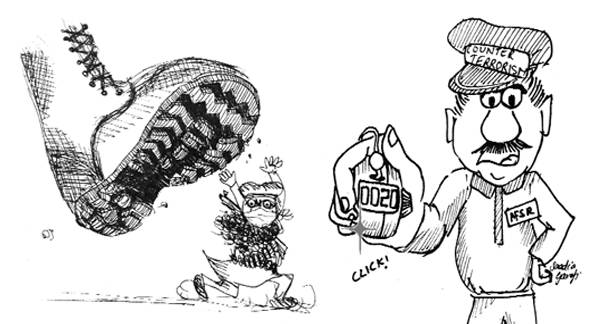
Back to school
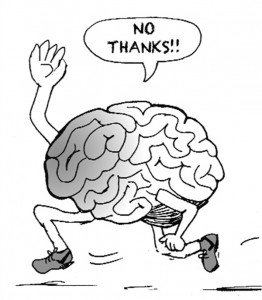
Sir,
Regardless of who is in government, I want to make a case for immediate, instrumental education reforms. First and foremost, we must enforce one syllabus. All tuition centres must be shut down and declared prohibited. Such private tuition centers have ruined the standard of education. Both the teachers and school administrations seem to be the partners in this crime; they exploit and hijack the students and parents.
School timing should be from 8am to 5pm including lunch and games. Thus there will be no homework and no time for evening tuition. The number of subjects should be a maximum four for primary classes, six for middle school and eight for matriculation students. Government and private schools must issue syllabus books free of cost. The books should remain in the school custody and be available for the next promoted classes.
Long term steps must also be taken. Every 3,000-house community should have one education centre from primary school to intermediate college. The school or college building should be located in the centre of the community where students may arrive using free transport arranged by the government. The government must ensure 100% participation of children where the parents and notables get directly involved and ensure regular attendance. The system must guarantee career planning and job confirmation.
Education is the only remedy of all ills of Pakistan.
Shafqat Sultan,
Rawalpindi.
Calamity and opportunity
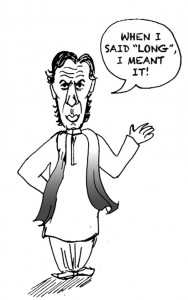
Sir,
Pakistan is no stranger to political storms and melodramas. Thus, the million dollar question is why the protest by the PTI has caused so much surprise and dismay. The answer to that questions is that the democracy-lovers were a little overjoyed over the first-ever democratic transition of power from the PPP to the PML-N in the wake of the 2013 elections, in which the latter surprisingly won a landslide victory. The political pundits who had predicted a ‘hung Parliament’ with the biggest electoral pie for the PTI were wrong, and so were the brains of the PTI.
Nonetheless, the party formed a government in Khyber Pakhtunkhwa – undoubtedly a formidable governance challenge due to the ever-rising tide of militancy in the troubled province. Had the PTI gone by the following pearls of wisdom, the party would have fared better: “An optimist sees opportunity in every calamity and a pessimist sees calamity in every opportunity.” By the same token, the PTI was supposed to take the bull of that tough challenge by its horns and turn it into an opportunity by ensuring some amount of tangible good governance to be presented as a role model to inspire trust and confidence in the voter across Pakistan for the next elections due in 2018.
But unfortunately, the party has glaringly failed to establish itself as being interested in governance rather than only government. Manifested in the much trumpeted mega projects with electioneering value, the PML-N government’s single-minded focus on Punjab – the largest province of Pakistan in terms of population – has led Imran Khan to assume that the Punjab-oriented development spree is highly likely to enhance the Sharif brothers’ political stature leading to substantial erosion of PTI vote bank in the province that holds the key to power in Pakistan.
But the volatile international geo-political situation and deeply-entrenched ethnic, sectarian and political polarization in Pakistan call for a peaceful democratic evolution in the country that cannot bear the brunt of any revolution which is more often than not accompanied by violence and other pitfalls as evidenced by the so-called Arab Spring, which has plunged the whole region into political anarchy and humanitarian crises.
A democratic evolution requires politics of consensus not confrontation as democratic transition has always been a slow process to be catalyzed by building up of the civilian soft power through unwavering commitment to good governance for socio-economic uplift of the ruled.
It is hoped that the sanity will prevail over political madness and the country will survive the pangs and pains of democratic transition continuing its democratic march towards a truly democratic, peaceful and prosperous Pakistan.
Munawar Mahar,
Islamabad.
How to fight terror
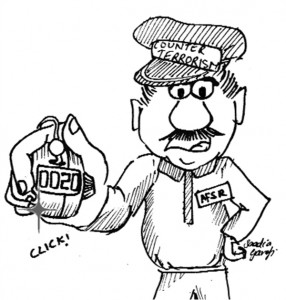
Sir,
Pakistan is fighting terrorism for the last 10 years without much success. The basic reason or that failure is an absence of a comprehensive counter terrorism strategy which in itself is the result of lack of conceptual clarity, vision, sincerity of purpose, resolve and selfishness on the part of our leadership. Currently, the peace through negotiations or military operations is very earnestly being debated somewhat superficially without comprehending the issue of terrorism and extremism in its entirety. This has created an impression that the terrorism and extremism will end either by successful talks with, or military operations against the Taliban.
Taliban are just a factor and not the only factor responsible for the present state of affairs in the country though their terrorist activities have exceeded the tolerance threshold and definitely requires immediate and stern action. However, the exclusive and exploitative socio-economic, religious-sectarian, foreign/internal policies and corruption of the rulers since 1947 are the real causes of the discontentment, frustration, loss of hope and confidence in the country amongst the masses. This situation created the ideal conditions for the emergence of TTP and other terrorist groups and acceptance of their ideology/narrative by a considerable percentage of our population. These conditions have been successfully exploited by the hostile agencies and foreign powers for the realization of their vested interests turning Pakistan into the battle ground of many proxy wars.
Long term policy objectives should aim at inclusive and distributive socio-economic policies, education/madrassa reforms, restructuring of state institutions, population control/management, elimination of political interference, speedy and free justice, electoral and judicial reforms and control of mafias and cartels etc. Medium and short term objectives should include the police, intelligence agencies reforms, anti-terrorism legislation in consonance with threat perception, creation of a Counter- Terrorism Force (CTF) with integral intelligence capability, prosecution branch under a unified command structure at the federal level with authority and capability to operate and act immediately throughout Pakistan on actionable intelligence. This force must be equipped with the latest intelligence gathering gadgets and weapons and equipment. The success of CTF will depend upon the quality of actionable intelligence, its quick reaction capability, political non- interference and targeting the nexus of corruption, politically backed and organized crimes and terrorism.
The immediate objective of the counter terrorism strategy must be the elimination of TPP and other terrorist groups. Should the military operation becomes inevitable, it should be launched wholeheartedly and ruthlessly with clearly defined military/political objectives and time frame. However, permanent and sustainable solution can only be achieved through the long term strategic objectives with in an overall National Security Policy which must address the root causes of terrorism and extremism in the society in its entirety. This will require national consensus, political/national will and above all the leadership beyond personal economic/political interests with vision, capability and determination.
Mian Muhammad Siddique,
Lahore.
Syria and Lehman brothers
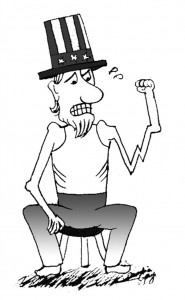
Sir,
For some unknown reasons, heavens seem not very benevolent on Americans between September and December. Most of the past catastrophic events have befallen the United States during these months. It is for American mystics, if there are any, to fathom reasons of this curse; but for us, the gentiles living in American imperial era, the cataclysmic events bring joy.
When Lehman Brothers announced it was filing for Chapter 11 of Bankruptcy Protection, not even the sharpest of the financial wizards could anticipate the financial meltdown which followed. It was on September 15, 2008 that Lehman Brothers kicked the first block of the domino. What happened next is very recent history. Who on earth could have thought that bankruptcy of one institution will have such far reaching consequences? It actually proved to be proverbial last straw. The USA and Europe are still feeling the effects of the financial crisis triggered in September 2008.
September 11 has become a watershed event in the world history. It was the biggest terrorist act on the American soil. But by contemporary standards, it was nothing out of this world. What followed post 9/11 is beyond comparison with effects of any single event in the human history.
What happens in the USA or what the USA does to others is of importance to the whole world. But what has happened in September 2013 may again be a foretaste of the world to come. And if so, how will the world look like in a few years or decades? In human history, great empires have risen and fallen. They controlled large areas, even continents and oceans, commanded big armies and enjoyed great wealth. They had and left indelible imprints on contemporary cultures and civilizations – the Roman Empire, Persian Empire, the Mughals, Arabs, Chinese, and most recently the British Empire. The list of their achievements is unending, and so is the list of their follies.
The Syrian crisis is that moment or event which will be remembered as a turning point in the history of American hegemony. It occurred in September too. It is being hailed as victory of diplomacy. It is in fact the fall of first block of domino. For the first time, the USA had to go back on its threats of war. First time, Europe refused to be bullied and brought down American ambitions, although we witnessed it partly in 2003 when it decided to invade Iraq without authorization from the UNO. But then, few countries of Europe did join this US-led war. The French-led antiwar protest could not yield desired results. But this time round, what happened is synonym to American slide on the path of losing its position as sole superpower. It can conveniently be labeled as Lehman Brothers movement for American power. Russia has helped the USA in face saving exercise. But you do not expect strategic favours from your rivals. Do you?
The United States of America has lost ground so fast in the international arena that it is unbelievable. How could Moscow refuse Washington on Snowden? What happened subsequently on Capitol Hill illustrated the shrouded mystery. The USA is near bankrupt. Raising debt ceiling every now and then does not address the core issue of living beyond means. The question of Guns vs Butler is haunting the US lawmakers. The high moral grounds the USA enjoyed while lecturing the world on benefits of democracy lay bare. Such political polarization in the legislative branch of sole superpower is no good omen for the American “exceptionalism”. Who in his sanity would trust American lawmakers?
The US government shutdown also sent the wrong signals. How long can world accept USA as its leader when domestically it is so unreliable. Maybe next time the world needs American leadership to steer it out of crisis, American government is closed and on holidays? If American president can’t travel to attend an important summit due to government closure, how will he handle the world affairs? Isn’t it time to hand over leadership to someone more deserving and trustworthy? Put all this together and peep into the future. Of course, the immediate demise of the USA is not being predicted. The endeavour is to recognize the point of initiation of a long drawn historical process. Some time in future, the world will remember Syria as the Lehman Brothers of American power.
Ehtisham Amir,
Islamabad.
Spirit of democracy
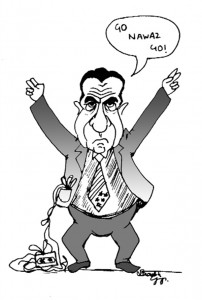
Sir,
Very often in Pakistan, and generally all over the world, elections are followed by the losing party accusing the winning party of rigging. Incumbent regimes remain at loggerheads with the opposition right after they assume office, which even results in a coup or a premature dissolution of the elected houses.
After allegations of rigging in the 2013 elections, people wrote in newspapers about the true spirit of democracy and the notion of peaceful, clean, elections. Some of them recently refer to the example of Scotland, where the people were asked if they wanted an independent Scotland or remain united with the UK. People exercised their voting rights fairly and freely, rationally applying their conscience to decide what they thought might be better for their nation. When people exercised their right to decide their future in a way different from he had expected, the country’s first minister, Alex Salmond, graciously announced his resignation.
Democratic norms require democrats having moral and ethical values in private and public life. That is why American President Richard Nixon resigned in 1974.
Abdul Ali,
Jutial.
Facing death in Syria
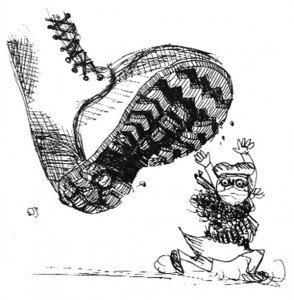
Sir,
The Peshmerga, whose name translates as “those who face death”, are the Kurdish fighters in northern Iraq. Kurdish peshmerga forces backed by US and British air attacks have pushed into territory held by ISIL in Iraq, recapturing several towns and villages that had recently fallen to the group. The Kurds had been boosted by air attacks on ISIL by the US-led coalition. Peshmerga fighters have been in stalemate with the ISIL in the past, but now this is changing. The Peshmerga, the armed force of Kurdistan Regional Government has a long history. First against the British colonial administration then against the Iraqi central government, it carried on years of guerrilla warfare with the advantages offered by the mountainous terrain and weather conditions in northern Iraq. Unlike other regional communities, who have seen a trend towards conservatism in recent years, Kurds have become more liberal, which some cite as a reason for the inclusion of female fighters fortifying their troops. Its members developed a reputation as fearsome fighters in decades-long battles against Saddam Hussein’s armies. The term Peshmerga is also used to refer to these Kurdish fighters generally. In the recent fight with Islamic State militants they are emerging as the force which is rapidly changing the equation on the ground. Not only they stopped the IS advances but now even retaking the territories which was held by IS from several months.
The air strikes of US and allies have definitely weakened Islamic State positions and helpful in stopping there advances but total elimination of IS depends on effective ground forces whether they be federal government forces in coordination with the US and coalition air forces, together with Peshmerga forces, or through the presence of ground forces from those countries. But at this point in time only Peshmerga forces are proving to be effective on ground against Islamic State as on ground any other forces have very thin presence or no presence. So realizing the importance of Peshmerga forces on ground the military help is coming from number of countries. It is clearly visible from recent surrender of Some 150 Islamic State militants to Peshmerga forces in Khurmatu in northern Iraq.
A broader effort to train the Peshmerga will face many challenges, as the force is splintered, corrupted and poorly trained to defend a new 1,000km frontline. But it’s a fact that the Peshmerga has proven to be an effective irregular army, providing security to all ethnicities. During the US-led invasion of Iraq the Peshmerga helped the United States in their mission to capture Saddam Hussein. They also captured Al Qaeda chief Osama Bin Laden’s messenger Hassan Ghul in 2004. For the decade since the US invasion of Iraq in 2003, the US poured billions of dollars into training the Iraqi army, while the Peshmerga was not provided sophisticated weaponry for fears it would accelerate Kurdish moves towards secession. But now it’s Peshmerga only which is delivering results on the ground. But looking back to years when Peshmerga forces didn’t enjoy the training or funds given to the Iraqi army things could have been very different if they could have been paid attention.
Manish Rai,
Delhi.

